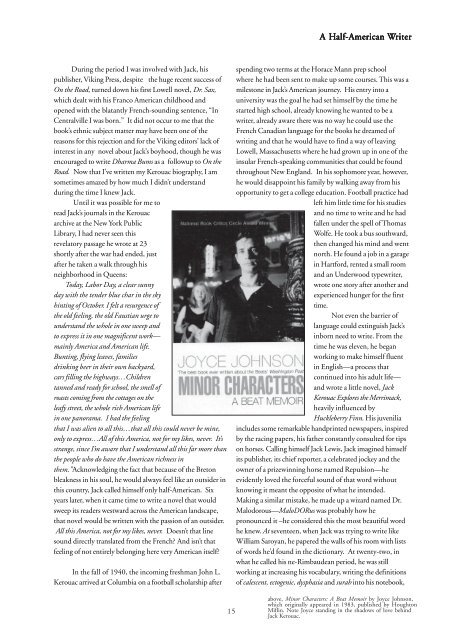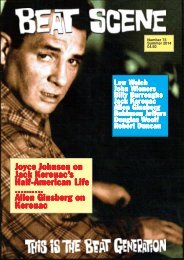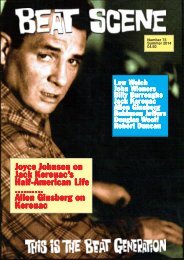Create successful ePaper yourself
Turn your PDF publications into a flip-book with our unique Google optimized e-Paper software.
A Half-American<br />
Writer<br />
During the period I was involved with Jack, his<br />
publisher, Viking Press, despite the huge recent success of<br />
On the Road, turned down his first Lowell novel, Dr. Sax,<br />
which dealt with his Franco American childhood and<br />
opened with the blatantly French-sounding sentence, “In<br />
Centralville I was born.” It did not occur to me that the<br />
book’s ethnic subject matter may have been one of the<br />
reasons for this rejection and for the Viking editors’ lack of<br />
interest in any novel about Jack’s boyhood, though he was<br />
encouraged to write Dharma Bums as a followup to On the<br />
Road. Now that I’ve written my Kerouac biography, I am<br />
sometimes amazed by how much I didn’t understand<br />
during the time I knew Jack.<br />
Until it was possible for me to<br />
read Jack’s journals in the Kerouac<br />
archive at the New York Public<br />
Library, I had never seen this<br />
revelatory passage he wrote at 23<br />
shortly after the war had ended, just<br />
after he taken a walk through his<br />
neighborhood in Queens:<br />
Today, Labor Day, a clear sunny<br />
day with the tender blue char in the sky<br />
hinting of October. I felt a resurgence of<br />
the old feeling, the old Faustian urge to<br />
understand the whole in one sweep and<br />
to express it in one magnificent work—<br />
mainly America and American life.<br />
Bunting, flying leaves, families<br />
drinking beer in their own backyard,<br />
cars filling the highways…Children<br />
tanned and ready for school, the smell of<br />
roasts coming from the cottages on the<br />
leafy street, the whole rich American life<br />
in one panorama. I had the feeling<br />
that I was alien to all this…that all this could never be mine,<br />
only to express…All of this America, not for my likes, never. It’s<br />
strange, since I’m aware that I understand all this far more than<br />
the people who do have the American richness in<br />
them.”Acknowledging the fact that because of the Breton<br />
bleakness in his soul, he would always feel like an outsider in<br />
this country, Jack called himself only half-American. Six<br />
years later, when it came time to write a novel that would<br />
sweep its readers westward across the American landscape,<br />
that novel would be written with the passion of an outsider.<br />
All this America, not for my likes, never. Doesn’t that line<br />
sound directly translated from the French? And isn’t that<br />
feeling of not entirely belonging here very American itself?<br />
In the fall of 1940, the incoming freshman John L.<br />
Kerouac arrived at Columbia on a football scholarship after<br />
spending two terms at the Horace Mann prep school<br />
where he had been sent to make up some courses. This was a<br />
milestone in Jack’s American journey. His entry into a<br />
university was the goal he had set himself by the time he<br />
started high school, already knowing he wanted to be a<br />
writer, already aware there was no way he could use the<br />
French Canadian language for the books he dreamed of<br />
writing and that he would have to find a way of leaving<br />
Lowell, Massachusetts where he had grown up in one of the<br />
insular French-speaking communities that could be found<br />
throughout New England. In his sophomore year, however,<br />
he would disappoint his family by walking away from his<br />
opportunity to get a college education. Football practice had<br />
left him little time for his studies<br />
and no time to write and he had<br />
fallen under the spell of Thomas<br />
Wolfe. He took a bus southward,<br />
then changed his mind and went<br />
north. He found a job in a garage<br />
in Hartford, rented a small room<br />
and an Underwood typewriter,<br />
wrote one story after another and<br />
experienced hunger for the first<br />
time.<br />
Not even the barrier of<br />
language could extinguish Jack’s<br />
inborn need to write. From the<br />
time he was eleven, he began<br />
working to make himself fluent<br />
in English—a process that<br />
continued into his adult life—<br />
and wrote a little novel, Jack<br />
Kerouac Explores the Merrimack,<br />
heavily influenced by<br />
Huckleberry Finn. His juvenilia<br />
includes some remarkable handprinted newspapers, inspired<br />
by the racing papers, his father constantly consulted for tips<br />
on horses. Calling himself Jack Lewis, Jack imagined himself<br />
its publisher, its chief reporter, a celebrated jockey and the<br />
owner of a prizewinning horse named Repulsion—he<br />
evidently loved the forceful sound of that word without<br />
knowing it meant the opposite of what he intended.<br />
Making a similar mistake, he made up a wizard named Dr.<br />
Malodorous—MaloDORus was probably how he<br />
pronounced it –he considered this the most beautiful word<br />
he knew. At seventeen, when Jack was trying to write like<br />
William Saroyan, he papered the walls of his room with lists<br />
of words he’d found in the dictionary. At twenty-two, in<br />
what he called his ne-Rimbaudean period, he was still<br />
working at increasing his vocabulary, writing the definitions<br />
of calescent, ectogenic, dysphasia and surah into his notebook,<br />
15<br />
above, Minor Characters: A Beat Memoir by Joyce Johnson,<br />
which originally appeared in 1983, published by Houghton<br />
Miflin. Note Joyce standing in the shadows of love behind<br />
Jack Kerouac.





